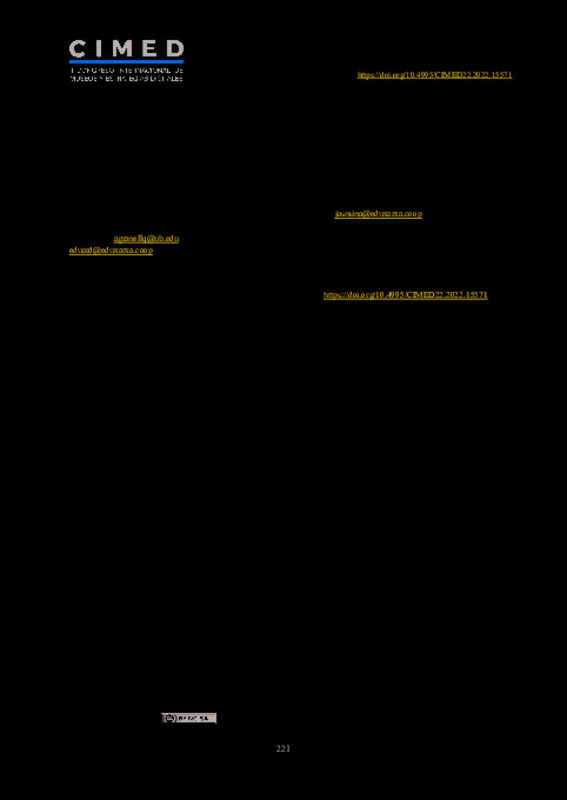|
Resumen:
|
[EN] ReAcc-MAC (Accessibility Resources at the Archeology Museum of Catalonia, Barcelona) is a
participatory research carried out by people with visual functional diversity. The objective is to
weave bonds between the ...[+]
[EN] ReAcc-MAC (Accessibility Resources at the Archeology Museum of Catalonia, Barcelona) is a
participatory research carried out by people with visual functional diversity. The objective is to
weave bonds between the museum and this collective This way, connections contribute to
achieving a more accessible and inclusive museum. This process is framed the paradigm shift
towards universal accessibility and social museology in Catalonia.
The agents that have intervened in this community research have been: the MAC, the Cooperativa
Eduxarxa, the research group formed by people with visual functional diversity, DIDPATRI of the
University of Barcelona and the Prevent Foundation. The research group has been the protagonist
of the project since they have been in charge of carrying out the analysis and evaluation of the
contents and the museography in an area of the exhibition space called Blue Sea Bridge. To
perform this research, a combined methodology has been used. On one hand, quantitative analysis
such as surveys. On the other hand, qualitative based on focous group method.
Regarding the results, a proposal co-designed by the research group was obtained to improve the
physical, sensory, and communicative accessibility of the Blue Sea Bridge area. It is worth
emphasizing the good evaluation of the project by the research group, since they highlighted that
their participation had been very beneficial, for both, the community, and the museum. In addition,
it was positively valued by partakers to have been able to participate actively and to see how their
opinion was actually taken into consideration.
In short, it is possible to co-create accessibility resources with the user community. With this
research, the replicability of this methodology is verified, and it is intended to encourage future
interventions of this type in other museum institutions.
This project has been supported by Becas “Premis Barcelona 2020” of Barcelona City Council.
[-]
[ES] ReAcc-MAC (Recursos de Accesibilidad en el Museo de Arqueología de Cataluña, Barcelona), es un proceso de investigación participativo llevado a cabo por personas con diversidad funcional visual. El objetivo es tejer ...[+]
[ES] ReAcc-MAC (Recursos de Accesibilidad en el Museo de Arqueología de Cataluña, Barcelona), es un proceso de investigación participativo llevado a cabo por personas con diversidad funcional visual. El objetivo es tejer vínculos entre el museo y este colectivo. De esta manera, los vínculos contribuyen a hacer del museo un sitio más accesible e inclusivo. Este proceso se enmarca en el cambio de paradigma hacia la accesibilidad universal y la museología social en Cataluña. Los agentes que han intervenido en esta investigación han sido: el MAC, la Cooperativa Eduxarxa, el grupo de investigación formado por personas con diversidad funcional visual, DIDPATRI de la Universidad de Barcelona y la Fundación Prevent. El grupo de investigación ha sido el protagonista del proyecto ya que se ha encargado de realizar un análisis y evaluación sobre los contenidos y la museografía en una parte del espacio expositivo del Puente del Mar Azul del MAC. Para llevar a cabo esta investigación, se ha empleado una metodología mixta. Por un lado, cuantitativa, como son las encuestas. Y, por otro lado, cualitativa basada en el modelo de grupos de discusión. En cuanto a los resultados, se obtuvo una propuesta co-diseñada por el grupo de investigación para mejorar la accesibilidad física, sensorial y comunicativa del espacio del Puente del Mar Azul. Cabe recalcar la buena valoración del proyecto por parte del grupo de investigación, ya que destacaron que su participación había sido muy beneficiosa para ambos, comunidad y museo. Además, se valoró positivamente participar activamente y comprobar como su opinión era tenida en consideración. En definitiva, es posible co-crear recursos de accesibilidad con la comunidad usuaria. Con esta investigación se verifica la replicabilidad de esta metodología y se pretende animar a realizar futuras intervenciones de este tipo en otras instituciones museísticas. Este proyecto ha contado con el apoyo de las Becas “Premis Barcelona 2020” del Ayuntamiento de Barcelona.
[-]
|








